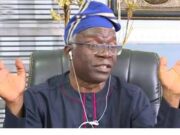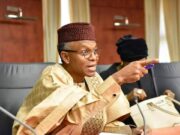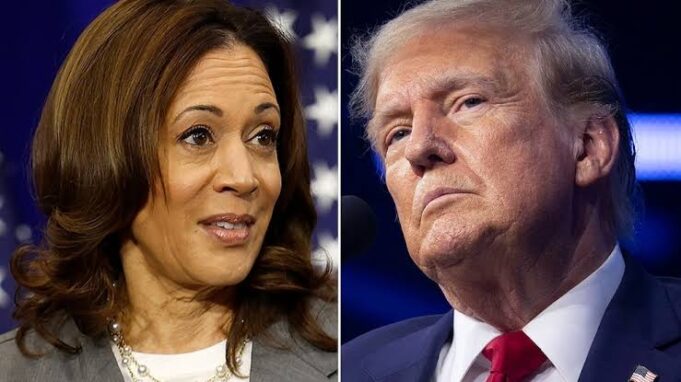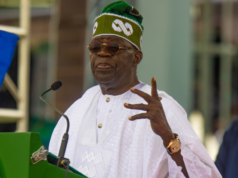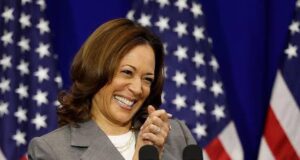As Americans prepare to cast their votes today, the race for the presidency remains fiercely competitive, with Vice President Kamala Harris and former President Donald Trump locked in a neck-and-neck battle.
Both candidates targeted the crucial swing state of Pennsylvania on the eve of Election Day, hoping to secure the victory in what is shaping up to be one of the most unpredictable elections in recent memory.
 Advertorial
Advertorial
Trump, seeking a dramatic return to the White House, has predicted a “landslide” win, while Harris is optimistic about her chances, emphasizing that momentum is on her side as she aims to become the first female president of the United States.
However, polling data paints a picture of deadlock, with surveys showing a virtual tie both nationally and in the key swing states where the election will likely be decided.
Pennsylvania, as the largest swing state, remains the most prized battleground under the U.S. Electoral College system, with both campaigns pouring resources into securing its 20 electoral votes.
 Advertorial
Advertorial
Early voting has surged, with more than 78 million Americans having cast ballots, already nearing half of the total number in 2020.
Trump’s campaign is focused on a broad base of support, particularly among male, white, and non-college-educated voters, while Harris’s team is leaning on women voters and issues like abortion, which they believe could swing the election in her favor.
At rallies across the country, both candidates have been making their final appeals.
Trump, on a whirlwind tour of the battleground states, addressed a rowdy crowd in Georgia with a jibe aimed at Harris: “Kamala – you’re fired, get out.”

The former president also expressed regret over leaving the White House after his 2020 loss, suggesting he “shouldn’t have left,” and hinted that, like in 2020, he may again contest the results if he loses.
Harris, for her part, has been vocal about the momentum she’s gaining, particularly following a series of encouraging recent polls.
At a rally in Michigan, she declared, “We have momentum – it’s on our side,” and emphasized her stance on ending the war in Gaza, appealing to Arab-American voters who have been critical of U.S. handling of the Israel-Hamas conflict.
 Advertorial
Advertorial
The international community is closely watching the election, which has far-reaching implications for global affairs, including ongoing conflicts in the Middle East and Russia’s war in Ukraine.
Both candidates have enlisted high-profile surrogates to boost their campaigns.
Trump has been supported by tech mogul Elon Musk, who has made headlines with his $1 million voter giveaways, while Harris has leaned on the star power of figures like former President Barack Obama, ex-First Lady Michelle Obama, and singer Beyoncé.
For many Americans, particularly in swing states, the election is fraught with tension and uncertainty.
 Advertorial
Advertorial
Khuraira Musa, a Nigerian-American Democrat, expressed her concerns over Trump’s agenda, particularly his “Project 2025,” which she believes would negatively impact Black communities, immigrants, climate change efforts, and women’s rights.
“I’m apprehensive, I’ve even volunteered to help Democratic voters in battleground states get to polling stations. Many others are doing the same.”
Despite fears about voter suppression, she emphasized that there was still strong turnout in critical states like Arizona, Georgia, and Michigan.
 Advertorial
Advertorial
Polling data as of Monday shows Trump slightly ahead by 2 points in a more favorable environment for Republicans, with a 50%-48% lead.
However, in an environment more favorable to Democrats, which includes higher turnout among women, college-educated white voters, and people of color, Harris holds a 3-point advantage.
Musa also refuted claims that Black voters are shifting toward Trump. “It’s simply untrue,” she said. “NBC polling shows Trump has only 9% support from Black voters, down from 12% in 2020.
Kamala Harris, on the other hand, has 87% support.”
 Advertorial
Advertorial
She reiterated her concerns over Trump’s immigration policies, highlighting his stance on mass deportations, which she fears will disproportionately impact undocumented African immigrants.
In contrast, Harris supports a pathway to citizenship for those living in the U.S. without legal status, as long as they have not committed crimes.
 Advertorial
Advertorial
As Election Day unfolds, all eyes are on the key swing states, where the outcome will ultimately determine whether Harris or Trump will emerge victorious and lead the United States for the next four years.


